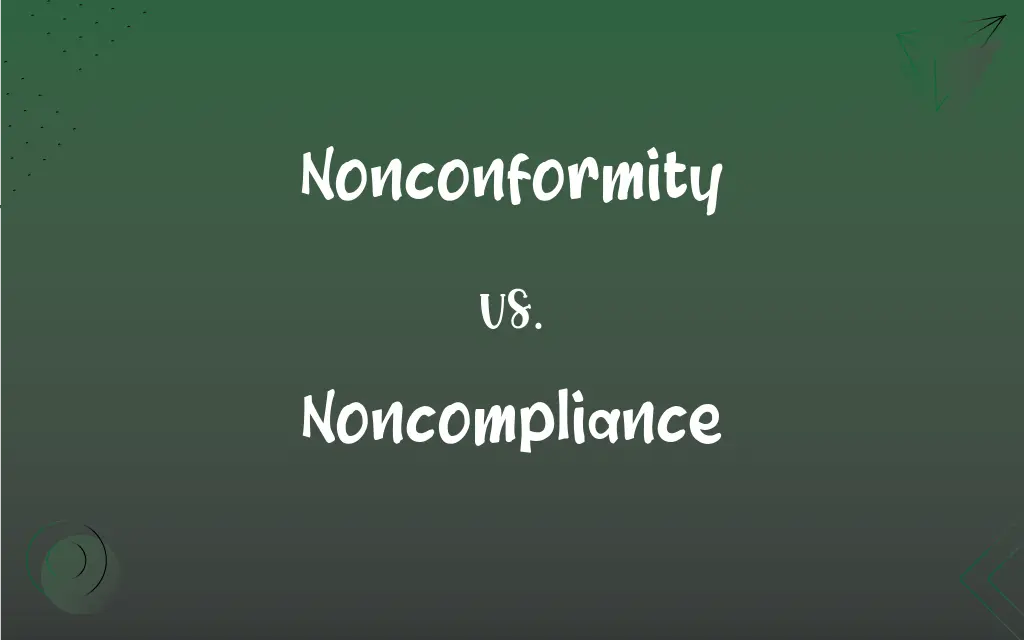Nonconformity vs. Noncompliance: What's the Difference?
By Harlon Moss & Janet White || Updated on May 22, 2024
Nonconformity is the act of not adhering to societal norms or expectations, while noncompliance refers to the failure to follow rules or regulations.

Key Differences
Nonconformity refers to behaviors or attitudes that do not align with societal norms or standards. This can involve unconventional fashion choices, unique lifestyles, or dissenting opinions. People who practice nonconformity often do so to express their individuality or challenge the status quo. Noncompliance, on the other hand, involves the deliberate or inadvertent failure to follow rules, regulations, or laws. This can occur in various settings, such as workplaces, schools, or legal systems. Noncompliance typically results in consequences or penalties, as it undermines order and discipline.
Nonconformity is often seen as a form of personal expression or rebellion against societal pressures. It does not necessarily involve breaking laws or rules, but rather deviating from what is considered 'normal' or 'acceptable.' For example, choosing an unconventional career path or lifestyle is a form of nonconformity. Noncompliance differs in that it directly relates to prescribed directives or obligations. It can be intentional or accidental, but it usually signifies a failure to meet specific requirements. For instance, failing to adhere to safety protocols at work constitutes noncompliance and can lead to serious repercussions.
Nonconformity can be viewed positively or negatively, depending on the context and societal perspective. It can inspire change and innovation or be perceived as disruptive. Noncompliance is generally viewed negatively, as it disrupts established systems and can lead to disorder or danger.
Nonconformity might not always result in immediate consequences, as it often depends on cultural or social acceptance. Noncompliance, however, typically leads to immediate corrective actions or penalties, especially in regulated environments where rules are strictly enforced.
Comparison Chart
Definition
Deviating from societal norms or standards
Failure to follow rules, regulations, or laws
ADVERTISEMENT
Context
Personal expression or rebellion
Legal, workplace, or institutional settings
Consequences
Varied, often context-dependent
Usually immediate corrective actions
Intent
Often intentional as a form of expression
Can be intentional or unintentional
Perception
Can be positive or negative
Generally negative
Nonconformity and Noncompliance Definitions
Nonconformity
The state of not fitting in with the majority.
His nonconformity made him stand out in a crowd.
ADVERTISEMENT
Noncompliance
Unintentional rule-breaking.
Noncompliance due to misunderstanding the guidelines is common.
Nonconformity
Opposition to societal conventions.
Nonconformity drove the artist to create unique and controversial works.
Noncompliance
Failure to adhere to rules.
His noncompliance with company policies led to his dismissal.
Nonconformity
Deviation from societal norms.
Her nonconformity was evident in her unconventional fashion sense.
Noncompliance
Deliberate disregard for laws.
Noncompliance with traffic laws resulted in a hefty fine.
Nonconformity
Rejection of traditional practices.
Nonconformity led her to pursue an alternative lifestyle.
Noncompliance
The act of not following regulations.
Noncompliance with safety protocols can result in severe penalties.
Nonconformity
Refusal or failure to conform to accepted standards, conventions, rules, or laws.
Noncompliance
Resistance to following directives.
Her noncompliance with the court order caused legal issues.
Nonconformity
An instance of this
A measure aimed at reducing nonconformities to the housing code.
Noncompliance
Failure or refusal to comply.
Nonconformity
Often Nonconformity Refusal to accept or conform to the doctrines, usage, or polity of the Church of England.
Noncompliance
A failure to comply.
Nonconformity
(Geology) An unconformity in which the underlying strata are composed of igneous or metamorphic rock and the overlying strata are composed of sedimentary rock.
Noncompliance
Neglect of compliance; failure to comply.
Nonconformity
Refusal to conform to the doctrine, discipline, or practice of a state religion, especially refusal by other Protestants to conform to the doctrine or discipline of the Church of England; the principles or practice of nonconformists; nonconformists as a class.
Noncompliance
The failure to obey
Nonconformity
Rejection of, or failure to conform to, a practice, standard, rule, or law.
Nonconformity
(geology) A type of unconformity in which a non-sedimentary rock intrudes in sedimentary layers.
Nonconformity
Neglect or failure of conformity; especially, in England, the neglect or refusal to unite with the established church in its rites and modes of worship.
Nonconformity
Lack of harmony or correspondence
Nonconformity
A lack of conformity
Nonconformity
Unorthodoxy as a consequence of not conforming to expected standards or values
Nonconformity
Failure to conform
Nonconformity
Embracing individuality over group norms.
He valued nonconformity and often challenged societal expectations.
FAQs
Can nonconformity be positive?
Yes, nonconformity can lead to innovation and positive change.
What is nonconformity?
Nonconformity is the act of deviating from societal norms or expectations.
Is noncompliance always negative?
Generally, yes, as it disrupts order and can have serious consequences.
What are examples of nonconformity?
Dressing unconventionally, pursuing non-traditional careers, or challenging societal norms.
What are examples of noncompliance?
Not following workplace safety protocols, ignoring traffic laws, or violating court orders.
What are the consequences of nonconformity?
Consequences vary and depend on social or cultural acceptance.
Why do people engage in noncompliance?
Reasons vary from deliberate resistance to unintentional mistakes.
What is noncompliance?
Noncompliance is the failure to follow rules, regulations, or laws.
How is noncompliance perceived in institutions?
Generally negatively, as it undermines order and discipline.
Is nonconformity the same as noncompliance?
No, nonconformity involves personal or social norms, while noncompliance relates to legal or institutional rules.
Can noncompliance be unintentional?
Yes, it can occur due to misunderstandings or lack of awareness.
Why do people practice nonconformity?
To express individuality, challenge norms, or promote change.
Is nonconformity always intentional?
Usually, as it often involves a deliberate choice to deviate from norms.
Can noncompliance lead to legal issues?
Yes, especially if it involves violating laws or regulations.
Can nonconformity inspire social change?
Yes, by challenging and reshaping societal norms.
Is noncompliance always punishable?
Often, especially in regulated environments, but context matters.
What are the consequences of noncompliance?
Usually immediate corrective actions or penalties, such as fines or disciplinary measures.
How is nonconformity perceived in society?
Perceptions vary; it can be seen as positive (innovative) or negative (disruptive).
Can nonconformity be subtle?
Yes, subtle forms include mild deviations in dress or behavior.
Can noncompliance be systemic?
Yes, systemic noncompliance can occur in organizations or industries failing to adhere to regulations.
About Author
Written by
Harlon MossHarlon is a seasoned quality moderator and accomplished content writer for Difference Wiki. An alumnus of the prestigious University of California, he earned his degree in Computer Science. Leveraging his academic background, Harlon brings a meticulous and informed perspective to his work, ensuring content accuracy and excellence.
Co-written by
Janet WhiteJanet White has been an esteemed writer and blogger for Difference Wiki. Holding a Master's degree in Science and Medical Journalism from the prestigious Boston University, she has consistently demonstrated her expertise and passion for her field. When she's not immersed in her work, Janet relishes her time exercising, delving into a good book, and cherishing moments with friends and family.































































